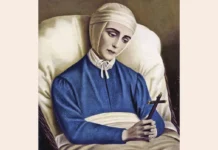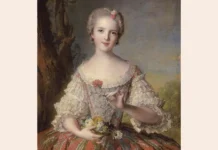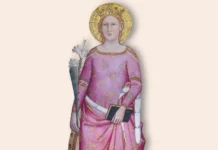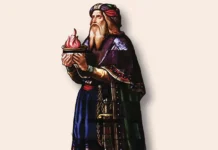His great feat in life was accepting the apparent ruin of his aspirations, conforming himself entirely to the divine will. He was nothing in the eyes of men, but he was a great saint in the eyes of God, who judges the heart
and not appearances.
A person’s fulfillment is often measured in terms of his success in life, the position he reached, the prestige he won or the wealth he amassed. However, this is not the teaching that emanates from Holy Scripture, which says of those who strive to gather wealth without using it to glorify God: “For all their riches mortals do not abide; they perish like the beasts” (Ps 49:13), or “What profit is there for one to gain the whole world yet lose or forfeit himself?” (Lk 9:25).
For God, what matters above all else is man’s conformance to His holy will. He does not demand the same from every soul. He destines some to hold high offices or to distinguish themselves by their works, as long as these are always centred on the love of God. Others He calls to renunciation and sacrifice. Each will be great before God, and the latter will have no less merit than the former. The divine tribunal does not judge by external appearances, but according to the degree of docility to the will of God.
The story of Blessed Raphael offers us an example of this complete and selfless surrender of a life that could have shone in the eyes of the world.
A privileged child
Raphael Arnáiz Barón was born in Burgos, Spain, on April 9, 1911, to an aristocratic family. His parents, fervent Catholics, diligently taught him to practice the Commandments and to love virtue. Once, when he was ten, he was unable to go to Sunday Mass with the other children due to illness, so he begged a priest to bring him the Blessed Sacrament. Impressed with the child’s piety, the priest consented, and from that time forward, Rafael never missed Sunday Communion.
A future beaming with clear blue skies opened before young Raphael’s profound gaze. His keen intelligence, lively conversation and kindly demeanor added to the natural attraction that drew people to him, winning him a host friends. He also possessed a marked artistic leaning which enhanced his appeal.
However, Raphael seemed more inclined to the contemplation of celestial things than of the banalities of earthly life. He lead a life much like that of his peers, but his gaze easily took flight to God. One could say that his noble soul experienced the exile of this valley of tears and burned with a desire for sublime horizons. The yearnings that Providence instilled in the innocent youth would not have long to wait.
First awakening to his vocation
At 19 years of age, while staying at the home of his uncle in Avila, he was asked to deliver a letter to the abbot of the Cistercian monastery of St. Isidro de Dueñas. For Raphael, this visit was the trumpet call announcing his vocation.
What I saw and experienced in the Trappist monastery, he would later write, the impressions that this holy monastery made on me, cannot be explained; at least I do not know how to explain them, only God knows. […] What most impressed me was the singing of the Salve Regina, at twilight, before retiring. […] That was truly sublime. 1
In fact, since the time of St. Bernard it had been the custom in Cistercian monasteries to sing the Salve Regina in Gregorian chant, right after Compline, in homage to the Blessed Virgin. Looking on, as that moving hymn was intoned by 50 monks dressed in white habits, Raphael felt drawn to imitate them. It was on that day that the idea of dedicating himself to monastic life began to germinate in his soul.
There were no apparent changes in his lifestyle; He applied his gift for drawing, studying in the school of architecture in Madrid for two years. However, grace had worked a true miracle in him, as he himself explained: There [in the Trappist monastery] alone with God and my own conscience, my way of thinking, feeling, and most importantly, acting in earthly affairs, changed. 2

The decision to embrace religious life
In 1933, once again in Avila, Raphael surprised his uncle with the news that he had decided to abandon the world and enter the Cistercian Order, without even telling his parents, who lived in the north of the country, in the city of Oviedo. This is how his uncle described the impression his nephew’s decision made on him:
Raphael was physically weak, but the strength lacking in his body was more than made up for with that of his soul. […] He had a will of iron; I was thoroughly convinced that his decision came from God; it was not a whim, nor an impression, nor a mistake; it was the divine fruit of a correspondence to grace, that the Holy Spirit deigned to support with one of His most precious gifts: fortitude. 3
To dissuade him from his decision of not going to Oviedo beforehand, his uncle appealed to the Apostolic Nuncio, who was in Avila. In face of an order from that religious authority, Raphael relented for love of obedience, recognizing in that order the first step toward the cross he so desired to embrace.
He departed for Oviedo, and after celebrating Christmas there with all good cheer, he informed his parents of his decision. As good Christians, they accepted it with true joy, thanking God for the gift He had given them.
A new phase in Raphael’s life
A new phase had begun for young Raphael: he left behind comforts, family affection, worldly amusements and the promise of a brilliant future. Above all, he renounced that to which the human creature is most profoundly attached: his own will. This, from now on, he would conform entirely to the divine will.
On January 15, 1934, the doors of the Cistercians opened to the young postulant. His heart was full of good resolutions, which he undertook with these words written a few days before entering: I want to be holy before God, and not men; a sanctity which develops in the choir, in work, and above all in silence; a sanctity known solely to God and of which even I myself am unaware, since it would not otherwise be a true sanctity. 4
This sanctity would be achieved in the midst of unspeakable sufferings and trials, in apparent futility, devoid of any exterior manifestation.
The first period of religious life was a veritable paradise for Raphael. Though the fasts and mortifications sometimes wrung tears from his wracked being, his soul felt inundated with consolations. The humility he displayed in accusing himself of his faults in his religious chapter, and his rapt attention before the tabernacle, favourably impressed the community, which soon grew fond of him.
The difficult trial of illness
For Raphael, his breaking off with the world was something that was already behind him for good. However, this was not the divine plan. He was enjoying a time of tremendous spiritual bliss when, in May, he felt the first symptoms of the illness that would end in his death. The loss of his strength obliged him to enter the infirmary. A short time later, the doctor diagnosed the illness as diabetes. It was progressing at an alarming rate and demanded proper treatment, which could only be administered outside the monastery.
The ascent to Calvary had begun, and it was the moment for the humble acceptance of the chalice presented to him. He was obliged to return to the world, which he had so generously renounced!
His confessor, Fr. Teófilo Sandoval, describes the scene of his departure from the monastery:
The sighs and tears of the afflicted Raphael made me realize that inside he was suffering a tremendous spiritual crisis which weighed heavily upon his heart. “When I left the world—he told me—I bade farewell to everyone until eternity, and from the entire Asturian press I knew that grace had triumphed in me, conquering nature… Now I return there dilapidated and useless, with a burial cloth in my suitcase… What will the world, which is so easily scandalized, say? I want to die here; I wish this was the last night of my life!” Hearing these words, I understood that Raphael had entered into the terrible dark night of sense, of the heart. 5
Raphael returned to his home. In a few weeks there was a marked improvement to his health, and he was able to resume a normal life. On the outside he seemed to be the same Raphael as before, with his contagious joy and his artistic sense. However, a profound change had taken place in his soul, completely reshaping it. He experienced another joy, one known only to souls that love the cross.
This is what he wrote to one of his superiors, some days after his departure from the monastery: When I went to the Trappist monastery, I gave to Him [God] everything I had and everything I possessed: my soul and my body… My offering was absolute and total. Therefore, it is only right that God now does with me what He sees fit and what pleases Him, without any complaint on my part, nor any sign of revolt. […] God not only accepted my sacrifice, when I abandoned the world, but He asked of me a still greater sacrifice, that of returning to it… For how long? God has the final say. He gives health, and He takes it away. 6
These words express well the spirit of obedience with which he had accepted the trial sent by Providence. For one year and a half he had to endure that exile, during which his love of God grew and ascended to greater heights. Upon entering the Cistercian Order, he had divested himself of everything, but still held fast to his desire of being a good Trappist, of becoming a priest; he sought his own way, as he would later affirm. God, as a benevolent Father, taught him the way to purify his soul of this very legitimate, but still human rigidness.
Finally, Raphael implored to be readmitted to the monastery as an oblate, since his health would not allow him to adopt the regime of monastic life.
In January 1936, he entered for the second time. New trials awaited him there: isolated in the infirmary, subjected to a dietary regime that provoked the criticism of his companions, and suffering from the incomprehension of some of his superiors, Raphael felt completely alone. Due to his physical frailty, he was not even permitted to participate in the singing of the Divine Office in the church. To these sufferings were added terrible temptations, which presented him with the thought that he had mistaken his vocation. He confronted all of this with vigour of soul and a steadfast smile on his lips.
The illness would force him to leave his beloved abbey two more times, but he always returned, convinced that this was the place destined for him by the same divine will that seemed to put the obstacles in the way.

The final months of his life
The final months of Raphael’s life were the last steps to the summit of the Calvary he had resolved to ascend, as his writings during this period, imbued with intense spirituality and love of perfection, clearly indicate.
His soul had attained that indifference counselled by St. Ignatius, by which one desires nothing for oneself and abandons oneself completely to the divine good pleasure. One sole passion reigned in his heart: God!
Everything I do is for God. It is He who sends the joys; He who gives the tears; for Him I take my nourishment, and when I sleep, I do so for Him. My rule is His will, and His desire is my law; I live because it pleases Him, I will die when He wishes. I desire nothing but God. […] I wish that the entire universe—with all the planets, the heavenly bodies, and the innumerable galaxies—were one immense flat surface upon which I could write the name of God. I wish my voice were more powerful than a thousand thunderclaps, and stronger than the force of the sea, and more terrible than the eruption of volcanoes just in order to say “God”. I wish my heart were as large as heaven, as pure as that of the angels, and as meek as a dove so God would dwell there. 7
Meanwhile, the illness advanced rapidly. Raphael suffered from hunger—the brother orderly did not provide him with the food that the disease required—and, above all, thirst… an unquenchable and consuming thirst which would accompany him until his final moments. However, he did not let any of this appear outwardly, giving others the impression that he was feeling better.
At the end of April he could no longer hide his alarming state. The deliriums produced by fever were followed by moments of lucidity, during which he showed himself to be serene and resigned. He received the anointing of the sick on the 25th, but God wished him to endure being deprived of Holy Viaticum. To the encouraging words of the monks who tried to alleviate his suffering by telling him of their hope for a cure, Raphael only responded that he was convinced he would soon be leaving for Heaven.
He died on the morning of April 26, 1938, as the result of a diabetic coma. His peaceful countenance and smile reflected the glory that his soul already enjoyed in heavenly bliss.
A soul enamoured of Christ
From a merely human point of view, Raphael’s short life seemed to be a complete failure: he did not fulfil his career, he was not recognized in society, he did not realize his dream of becoming a priest, nor did he even have the consolation of observing the Trappist rule and pronouncing his solemn vows.
Yet, things were very different in the eyes of God, who does not judge by appearances, but according to the heart. Raphael practiced an extraordinary form of sanctity: enamoured of God, his soul attained heroic virtue within the most complete silence, suffering and obscurity.
His example of humility and ardent charity can also help us to joyfully accept whatever the Divine Will wishes to send us.
Now I realize what my vocation is. I am not a religious… nor a layman… I am nothing… Blessed be God! I am nothing more than a soul enamoured with Christ. […] A life of love—this is my Rule… my vow… This is the only reason to live. 8 ◊







